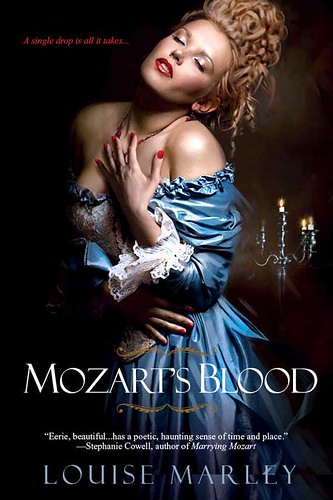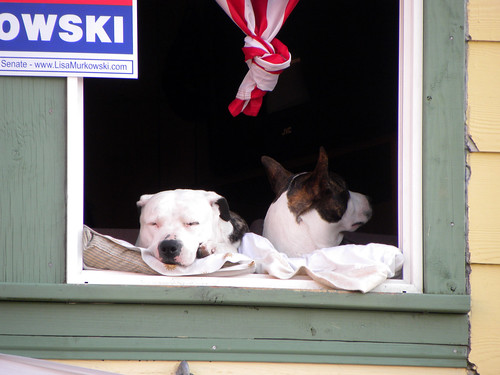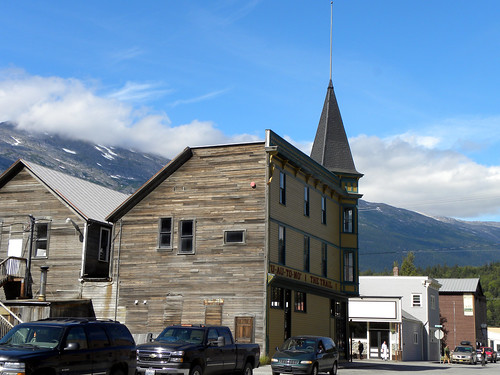To be an up and coming soprano with a contract to sing Donna Anna–in Milan, at La Scala, no less!–is already to be extraordinary. Octavia Voss is even more singular than that. Born in Italy centuries before the present day, she left home as a teen to pursue the dream of becoming a singer. Talent and determination get her into an opera company, but there she learns that her voice is perhaps less special than she imagined; her career prospects may be limited.
Then a depraved-seeming Countess lures Octavia and the company’s composer into a tryst. After the encounter, Octavia has been utterly transformed. She craves blood, for one thing. For another, she, the Countess and the composer all share each others’ memories… a powerful thing, considering that the composer is Wolfgang Amadeus Mozart!
Lifetimes later, Octavia still lives to sing. Her vampiric lifestyle, and her intimate exposure to Mozart’s genius, have given her endless years to perfect her craft and enjoy a bit of the limelight. But to maintain her secret, she must also endure painful periods of forced retirement. At present, happily, she is out of hiding and building a new career. Her partner in life is Ugo, a creature even more ancient than she, who acts as her personal assistant and ensures she has safe access to the blood she needs to survive. The two are very close, and when Ugo disappears just as Olivia reaches Italy to sing in Don Giovanni, she very nearly falls apart. She has become dependent upon him, perhaps to a dangerous degree, and as rehearsals go on and the usual backstage power struggles play out, the thirst–with which she’s made a terrible sort of peace–is on the rise.
Soon she will have to go out and hunt, for the first time in a long time, risking exposure. And with Ugo missing, it’s a safe bet that somebody’s after her, too.

As some of you may have read in my interview with Louise Marley earlier this summer, Mozart’s Blood is her twelfth novel. Marley’s background as a professional singer lends a satisfying richness to the behind-the-scenes action; the reader is immersed in the clique-y subculture of a professional opera company going about its work. She also offers an interesting twist on vampirism–Olivia and Mozart’s telepathic bonding when they ‘share the tooth’ is the rule, not the exception.
Vampires absorb the memories of all their victims, often to the detriment of their mental health. It is Olivia’s ability to compartmentalize these memories, focusing only on Mozart’s genius, that allows her to survive… at least until Ugo comes onto the scene with a better solution. Survivors of vampire attacks are always turned, and the rule–a sort of rebirth control, enforced by the Countess with ruthless absolutism–is that if Octavia feeds from someone, she must always kill them.
A cold-blooded creature she may be, but Olivia is a fundamentally caring woman, and it is this quality of hers that gives the book its warmth: her affection for Ugo, her sexual interest in one of the other singers, and above all her passion for opera offset the cruel realities of her condition. Mozart’s Blood tells us her life’s story, and Ugo’s (which is every bit as intriguing) in flashback, and both histories are impeccably researched.
I always enjoy Marley’s books, and this novel was no exception. Somehow, though, I found myself wanting an ephemeral ‘something more’ from it; as I read, I had a sense that I’d been more fully drawn into her previous novels. As I wrestled with the question of whether this was just nostalgia for past delights, my first thought was that perhaps those books felt more relevant, politically and socially. But Mozart’s Blood has plenty of political heft: Ugo in particular is born poor in a era where the financially vulnerable have no options at all, and Marley never sugar-coats such topics.
I also wasn’t entirely happy with how the person behind Ugo’s disappearance fit into the story–it had the feel, at times, of a puzzle piece jammed into the wrong spot. But that person’s eventual fate was delicious to behold. I was finally left to conclude that I’d loved Ugo, liked Octavia pretty well, but that they’d both paled a bit, for me, next to the protagonists of other Marley novels: Zahra of The Terrorist of Irustan, and the incredible Magdalene priest, Mother Isabel Burke, from The Child Goddess. And all that means is I may prefer Marley’s SF to her fantasy.
Science fiction Mozart’s Blood may not be, but it is an entertaining vampire novel–original, intriguing, with good historical content, and one that offers a believable vision of how chasing an artistic dream would be even more complicated for an immortal.
![]() Kelly‘s entries on William Shatner’s album Has Been
Kelly‘s entries on William Shatner’s album Has Been, Michael Bishop’s Brittle Innings
, and DD Barant’s Dying Bites
. Seriously. What she says about Shatner will make you snort chocolate milk through your nose.
will be out in a few short days.








